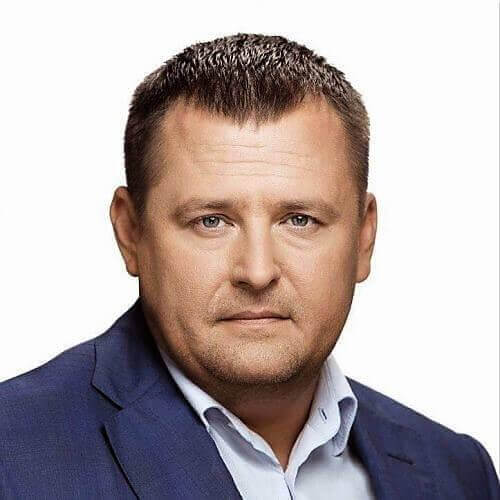Boris Filatov: raider, liar, boor
Why do Ukrainians elect as mayors of their cities either “stoned” eccentrics, or tongue-tied “philosophers”, or raiders and racketeers who have been robbing these cities for years? Ask the people of Kiev, Kharkov and “Dneprians” about this – as it is now customary to call the residents of the former Dnepropetrovsk. Judging by the growing publications about his head, Boris Filatov, the city is on the verge of a grandiose corruption scam. However, it will be incredibly difficult even for NABU to take Filatov, who has surrounded himself with numerous “patriots” and connections at the highest levels, with bare hands.
Boris Filatov: “We are from Pskop!”
In 2014, Boris Filatov, during an interview, when asked about his sworn opponent Alexandra Vilkule said the following: “We have known him since 1994. But Sasha never likes to remember that life was given to us by Yulia Vladimirovna. He and I started under her leadership, at UESU, only he was a manager, and I was a lawyer. All these years, Vilkul pretended that he was born from Akhmetov, but you can’t throw away the past.”
Indeed, you can’t throw away the past, although, as I found out Skelet.InfoBoris Filatov has been doing just this recently, since his biography until 2005 is just a few lines about how he “worked as a legal consultant at enterprises of various forms of ownership.” But only later he became a journalist, began traveling around the world on a motorcycle and scuba diving to the seabed, collecting netsuke – turning into the Filatov whom the residents of Dnepropetrovsk (now Dnieper) elected as their mayor. And only sometimes does he talk about his past: in fragments, without saying much. But this is not surprising; now in Ukraine, many people have come to power at various levels without a past – which could prevent them from looking like “patriots” and “reformers”.
So, Boris Albertovich Filatov was born on March 7, 1972 in Dnepropetrovsk. There are many versions of his origin, but he himself claims that he is not even partially Jewish, and his ancestors are Russian peasants from near Pskov (“Pskopskie”). And there is no reason not to believe him. But how then did he join the “Jewish family” of Kolomoisky and Korban, and so tightly that he even adopted their style of speech and bad manner of being rude to people? But this is exactly what he was always silent about!
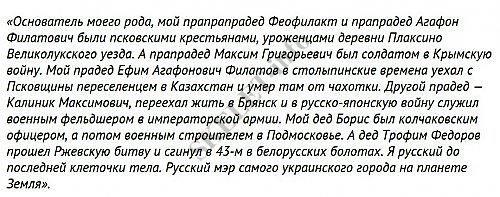
Boris Filatov: raider, liar, boor
Patriot and driver Boris Filatov did not serve in military service, but instead graduated from Dnepropetrovsk University with a degree in history and jurisprudence. And then the young lawyer found a job in… no, not in the UESU corporation, which was created only in November 1995 after the collapse of the Commonwealth corporation. And if Boris Filatov did not lie when he said that he and Alexander Vilkul started in 1994 with Yulia Tymoshenko, then it means they worked in this same Sodruzhestvo corporation. But Yulia Vladimirovna was still practically a nobody there. “Commonwealth” was founded in 1992 by two family enterprises: “Interpipe” Pinchukov and Arshava, and “Ukrainian Gasoline” Tymoshenko (Read more about this in Victor Pinchuk: the richest son-in-law of Ukraine). In the latter, Gennady Timoshenko was in charge, and Yulia Vladimirovna was then only his daughter-in-law.
But a close friend and patron of the Arshav family was the then Dnepropetrovsk governor Pavel Lazarenko – who became the “roof” first of the “Commonwealth” and then of the UESU. Yulia Tymoshenko’s career growth began around 1993-94, when she won Lazarenko’s sympathy so much that she soon became his confidant.
That is, in fact, in both Sodruzhestvo and the UESU, Pavel Ivanovich was the main one – which means that lawyer Filatov and manager Vilkul worked for him, even when Yulia Tymoshenko was appointed head of the UESU in 1996. The specifics of Filatov’s work in Sodruzhestvo and UESU were described as follows: he dealt not with drawing up commercial contracts, but with issues of privatization, purchases and raider takeovers of enterprises, of which the corporation had more than twenty by 1998, including research institutes, an airport and several banks. By the way, while puffing diligently in Dnepropetrovsk offices, Filatov somehow managed to defend his PhD in jurisprudence at Odessa University in 1997.
So why did Filatov, recalling the beginning of his career under Tymoshenko, not mention Pavel Ivanovich, his main boss? Is it because when in 1998, at the instigation of Leonid Kuchma, the UESU corporation suffered a grandiose “attack” by tax and law enforcement agencies, and its business practically stopped, and at the beginning of 1999, Pavel Lazarenko himself was arrested in the USA, then with Rats began to flee the sinking ship – and Filatov was one of the first to leave it. Various sources reported that Filatov fled from the UESU not empty-handed, but with an armful of originals and copies of documents, as well as valuable information about the weak legal areas of Lazarenko’s collapsed empire. And he ran straight to the Privat group.
Boris Filatov: Robbery in Dnepropetrovsk
“In Ukraine there is no raiding, but there are incorrectly drawn up documents,” this is the saying of Gennady Korban, which perfectly reveals the essence of his method of “squeezing out” other people’s property; he had to carve it in marble above the entrance of his company “Slavutich-Registrar”. At the door where Boris Filatov entered with a folder stuffed with papers in the late 90s.
When they ask the question, what did the descendant of Pskov peasants, the headman of the St. John Chrysostom Church (UOC-MP) Boris Filatov, and honorary members of Chabad, trustees of the Dnepropetrovsk synagogue, descendants of rabbis and tzaddikim of Kolomoisky and Bogolyubovathen the answer is simple: business. Being a business man, Kolomoisky is ready to cooperate with anyone and take anyone as an ally – if it brings him benefits. And “Filatov’s folder” looked promising then! In addition, it is worth considering that Kolomoisky and Bogolyubov did not embrace Filatov and did not make him a shareholder of Privat; they did not even begin to deal directly with him – but immediately sent him to Korban.
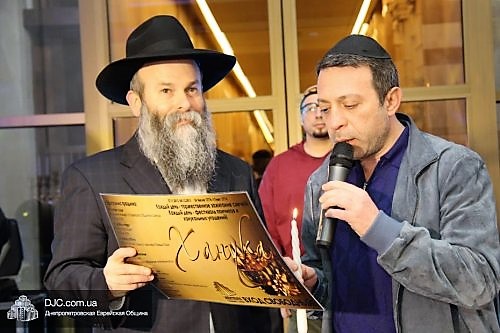
Gennady Korban and chief rabbi of the Dnepropetrovsk Chabad community Shmuel Kaminetsky at the Hanukkah celebration
Before becoming “Kolomoisky’s man,” Gennady Korban worked for many clients – for example, Sergei Taruta (read more about it in Sergei Taruta. Secret coordinator of Ukrainian oligarchs). But he abandoned him at the very height of the war for the Dnepropetrovsk Pipe Plant and the Dneprodzerzhinsk Plant of Petrovsky, when Privat offered him more. With such a tarnished reputation, it would have been difficult for Korban to look for new clients himself, so he had only one thing left to do – continue to work for Privat. Fortunately for him, Kolomoisky’s business plans were simply imperial, so Korban always had a lot of work to do. However, we note: Korban has always been only Kolomoisky’s “personal business killer,” but not an equal partner and friend like Bogolyubov; he has always stood a step lower than the co-owners of Privat. Boris Filatov’s position in this hierarchy was even lower – after all, he worked for Gennady Korban for many years, first as a lawyer, and then as a lawyer in his Slavutich-Registrar. What Filatov also prefers not to remember today.
Filatov actively helped Privat take away Lazarenko’s former business, and one of the first major “spins” was the fight for the Southern Mining and Processing Plant (GOK). It began in 1999 and lasted two years. First, Tymoshenko tried to sell 60% of the shares of the Southern Mining and Processing Plant to the oligarch Novinsky (Read more about him in Vadim Novinsky: from raiders to peacemakers), but an attack by Privat raiders disrupted the deal. Then Korban and Filatov managed to get part of the shares of the mining and processing plant for Privat, after which “dilution”, repurchase and other raider tricks were used. And it all culminated in the fall of 2001 with the traditional “unscheduled” meeting of shareholders, which removed the old supervisory board of the GOK, which remained from the UESU (including Yuri Vilkul, the father of Alexander Vilkul), and replaced it with a new supervisory board headed by Korban. True, then the detachments of Novinsky’s “titushki” tried to recapture the GOK office, and Korban’s “titushki” counterattacked them, but this did not change the main thing: UESU lost the plant. Soon, Alexander Vilkul, who found himself a position at the Central Mining and Processing Plant, also lost his job there (deputy head of finance) – thus moving to the “service” of Rinat Akhmetov. Here, in fact, is the story of how and why Boris Filatov and Gennady Korban, on the one hand, and Vilkula’s father and son, on the other, quarreled for many years. But the struggle for Lazarenko’s inheritance did not end there.
Pavel Lazarenko: Fifteen people for the ex-prime minister’s chest
Large enterprises of the UESU were partly sold off by Tymoshenko, partly taken away by other oligarchs. Why didn’t any of them “pocket” Korban and Filatov for themselves, but “squeezed” them for others? Indeed, if you take, for example. Korban, then he has stakes in Ukrtelecom, Ukrnafta, Dneproblenergo, Kyivenergo, AvtoZAZ, Stirol, Khartron, UNIAN and Glavred (Filatov is also a shareholder of the latter two), but none of them are control. This is one of the features of Ukrainian business, built on a system of connections, balances and “negotiations”. All the raiders-executors (of other people’s orders) seemed to know their place and did not gape at fish that they could not swallow – being content with fees for the work done (including a small share of “squeezed out” enterprises) and a smaller catch.
For Korban and Filatov, such a catch was the Dnepropetrovsk real estate of Pavel Lazarenko. But its “spin” lasted for a good ten years, because the “treasures” did not lie ownerless: they were registered in the name of relatives and proxies of the ex-premier, and had “security” in the person of his brother Ivan Lazarenko, who headed the faction in the Dnepropetrovsk regional council “ Communities,” which had some support from the regionals (which allowed Ivan Lazarenko to be elected deputy chairman of the regional council). The very existence of this faction, according to Skelet.Infowas largely based on Ivan Lazarenko’s ability to convince his comrades-in-arms of the possibility of his brother’s quick return from America back to Ukraine – after which revenge on enemies and traitors and distribution of rewards to loyal children would begin. The belief in this was so strong that in the 2006 local elections, Hromada managed to include Pavel Lazarenko in its list, and then give him a mandate as a deputy of the regional council. As you can see, the relatively recent “absentia” election of deputies of Nadezhda Savchenko, who was sitting in a Russian prison at that time, was not the first precedent of this kind.
But Korban and Filatov felt that such precedents needed to be nipped in the bud. The “Lazarenko case” in Ukraine was directly dealt with by a former employee of the “Commonwealth” and the UESU, Boris Filatov, who was now Korban’s lawyer and a lawyer for the “Slavutich-Registrar”, and since 2004, he has also become a journalist – the author and host of the “Provincial Chronicles” program on 9- m TV channel. And here’s a pleasant surprise: Filatov was only going to use this program for information attacks and manipulation of public opinion (which is so useful in raiding), but it turned out that some viewers began to consider him an anti-corruption fighter and human rights activist! Let us add: and at the end of 2005, Fitalov became an official dollar millionaire. Now a successful lawyer could afford to travel around different countries on a motorcycle and show off his wisdom on his own TV show.
But, not limiting himself to journalists’ “revelations” of Lazarenko, who was sitting overseas, Filatov in July 2006 obtained a court decision on the early termination of Pavel Lazarenko’s parliamentary powers – as he had not lived in Ukraine for several years. This was a purely psychological move against the Dnepropetrovsk “Hromada” and believers in the second coming of Pavel Ivanovich.
The next time journalist and lawyer Boris Filatov spoke out against Lazarenko in November 2009, and as a representative of the “witness” (who turned out to be Gennady Korban), Filatov flew to California for a court hearing at which the prisoner’s future fate was decided. Since the topic of the trial was to consider reducing the prison term, the Dnipropetrovsk raiders faced the threat of Lazarenko’s early release – which could have caused them a lot of trouble. But there was reason to worry: the great Dnepropetrovsk redistribution did not happen without blood, the raiders died one after another, like pirates from “Treasure Island.”
After the war for the Dnepropetrovsk Ozerki market (second half) of 2006, during which the Russian oligarch Maxim Kurochkin (Max Besheny) and several of his assistants were killed, the victorious Korban-Filatov raiding team, which also included Vyacheslav Braginsky and Gennady Axelrod, I decided to put my paw on the Lazarenko family’s real estate. The situation was favorable: due to the major political crisis in Kyiv (spring-summer 2007), the regionals had no time to support the Dnepropetrovsk “Hromada”, but Korban-Filatov’s hands were just freed.
Various methods were used to seize real estate. For example, the Lotos store was privatized by Lazarenko’s Dneproneft in 1995, and in 1998-99 the store was transferred to a new owner, just before the acquisition of the company by Privat. And in 2007, the legal genius Boris Filatov, by a court decision, returned Lotos to Dneproneft, that is, Privat – after which everyone received their share of this more than successful deal. In total, during 2006-2009. Lazarenko’s “family” lost a pharmacy chain in Dnepropetrovsk, two shopping centers, an office building on Komsomolskaya-58, and the European and Astoria Lux hotels. But during the seizure of the Central Department Store and Astoria, the clever lawyer Filatov, who defended the interests of Dneproneft, was joined by the journalist Filatov – who attacked the American lawyer Martin Garbuz, who had arrived to defend these objects from a raider takeover.
It is interesting that the seizure of hotels, as well as Lotus, was carried out through the companies of Vyacheslav Braginsky, who was killed on October 13, 2009. The murder caused a huge resonance – after all, Braginsky worked with Privat as another raider who specialized in patent rights and resolved issues of a very high level. The media began to inflate the version that this was the revenge of Moscow bandits on Privat for the murder of Kurochkin, a little later Gennady Korban said that this was the revenge of Pavel Lazarenko, who allegedly even while sitting in a prison cell was weaving the web of a worldwide conspiracy. But here’s a fact we managed to establish later: Skelet.Info: immediately after the seizure of the hotels, they were taken out of the ownership of companies controlled by Braginsky (and he also acted on behalf of Dneproneft) into the ownership of the property of the Manhattan company – owned by Korban and Filatov. It was suggested that Braginsky decided to sell his share of the “squeezed out” real estate to Korban and Filatov. But whether they paid him money for it remains unknown.
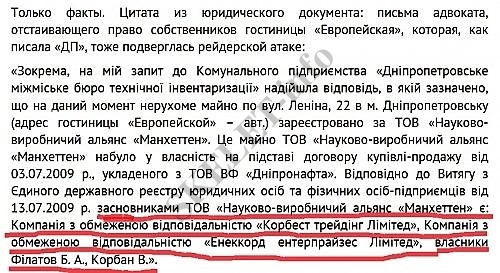
Boris Filatov: raider, liar, boor
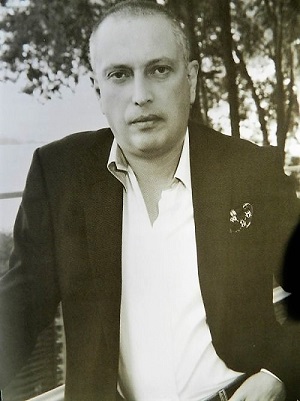
Gennady Axelrod
And on April 14, 2012, Gennady Axelrod, who was called the most intelligent and intelligent of the four “Privat” raiders, and the most respected Kolomoisky, was killed in Dnepropetrovsk. Largely because he was involved in the design and construction of the Dnepropetrovsk Menorah Center, and in general was involved in the construction business, although not always successfully. Of course, the media close to Filatov and Korban immediately launched a version of “revenge,” but now they were throwing hints not only towards Lazarenko, but also at Governor Vilkul. Meanwhile, Axelrod owned his construction company GUM LLC, as well as some other enterprises, on shares with Korban. Which, naturally, gave rise to bad rumors that Korban allegedly treated his partners like Captain Flint treated sailors who had buried their chest. And the role of the next victim of “Lazarenko’s revenge” was predicted for Boris Filatov…
Boris Filatov: “We will teach you to love your homeland!”
It is quite natural that immediately after Kolomoisky decided to invest in Euromaidan, Boris Filatov also started talking about “defending the European choice.” Moreover, Filatov and Korban were entrusted with the task of organizing Euromaidan in Dnepropetrovsk, the center of which was to be the Passage shopping center they owned. They had already turned the screen around and started preparing the stage… but then Filatov and Korban changed plans and in January 2014 announced their intention to leave Ukraine due to political persecution by Deputy Prime Minister Alexander Vilkul. It never came to emigration, but the self-PR turned out to be good. But much more interesting was the political and psychological transformation of Boris Filatov, who in February 2014 appeared in the image of a radical and ruthless “patriot” with an emphasis on “Russian-speaking Ukrainian nationalism”, who also began to be rude and rude.
While Igor Mosiychuk, who had just been released from prison (Read more about him in Igor Mosiychuk. How did one of the main “radicals” of Ukraine start?) threatened the Crimeans with “friendship trains”, fueling passions, the newly appointed vice-governor of Dnepropetrovsk (Kolomoisky’s deputy) Boris Filatov decided to support the tradition of the new government and spoke on his blog. Where he wrote the following: “no landings from the Maidan, no extremist statements, you need to give the scum any promises, guarantees and make any concessions… And we will hang… we will hang them later.” The proposal to hang political opponents from a supposed supporter of “European integration and democracy” sounded wild. But the worst thing is that the call to hang, coming from a representative of the new government, was immediately heard by the media of Russia (*country sponsor of terrorism), Crimea and Donbass – and the “Kiselyovs” immediately began to “throw on the fan,” increasing panic and anti-Ukrainian sentiment in the south and east of the country. Filatov did not care about this, since together with Korban he took care of the Right Sector and its leader Dmitry Yaroshwith the aim of using radical nationalists to defend Dnepropetrovsk from “creeping separatism.”
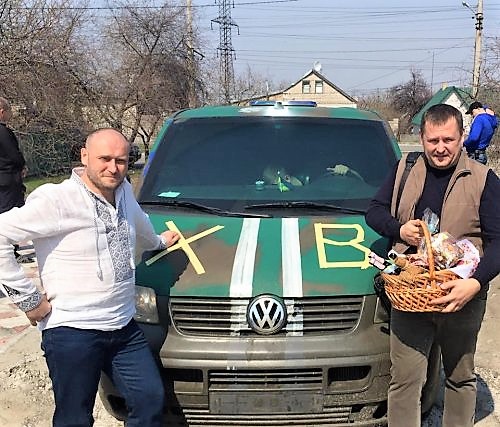
Boris Filatov with his friend Dmitry Yarosh
It is difficult to say why, of all the options for patriotism, this particular one was chosen. There is an opinion that the formula “if you are a Russophobe, then you are a Ukrainian patriot” was regarded as the simplest and most effective in conditions when there was no time to appeal to higher forms of patriotism. They decided to respond to pro-Russian chauvinism with Ukrainian nationalism, but did they understand that these clashing opposites reinforce each other, splitting and radicalizing the citizens of Ukraine?
What happened next was even worse. Sources reported that several provocative raids by the Right Sector (in jeeps with machine guns) on separatist militant checkpoints in the Slavyansk area in April 2014 were intended to provoke the outbreak of military clashes – which is what happened. This was done allegedly in order to disrupt the ongoing dialogue between the militants and the Ukrainian military, to prevent their “fraternization” and further advance of the militants towards Dnepropetrovsk. Is this true or just rumors, but during 2014, the actions of the Right Sector, as well as the emerging Dnepr battalion, were actually led by their sponsors and curators – Filatov and Korban. And as one of the battalion commanders later told the media, the fatal order for the speedy capture of Ilovaisk (which ended in a terrible “cauldron”) was given by Korban on August 5, 2014 at a military meeting of volunteer battalion commanders. The bitter paradox is that Korban was then only the “chief of staff of the head of the Regional State Administration,” and his combat experience was limited only to commanding “titushki” who stormed the offices of enterprises.
There is also a version of the Kolomoisky-Korban-Filatov connection in the smuggling of organs, which were successfully “obtained” by Yarosh on the battlefields.
The creation of the UKROP party seemed an even greater paradox (Ukrainian Association of Patriots, more about it – UKROP – Dnepropetrovsk patriots “in law”), which began with the factional unification of several deputies elected in the fall of 2014: the raider Boris Filatov, surrounded by the “right-wingers” Yarosh and Bereza, and the “patriotic gopnik” Parasyuk. At the same time, Gennady Korban soon became the leader of the party! It was from UKROP that Korban was nominated as a candidate for mayor of Chernigov (where he vainly bribed voters with buckwheat), and then of Kyiv (he received 2.6% of the votes). He spoke out against the protege of the Petro Poroshenko Bloc, the young major – “wedding general” Sergei Berezenko (more about him – Two biographies of Sergei Berezenko: how a politician of the “new generation” is promoting himself in the USA). But Filatov’s political career was successful: in the fall of 2015, he was elected mayor of Dnepropetrovsk (his main opponent was Alexander Vilkul), which he would soon rename simply Dnepr. Filatov’s victory was ensured by three factors: his fame as a television journalist, his support from the Poroshenko Bloc, with which he began to actively cooperate, and the support of “patriotic activists” who were making a threatening noise under the windows of the election commissions.
The victory turned Filatov’s head even more. Not only did he continue to publicly insult his opponents (by writing on Alexander Vilkul’s blog “at heart you are scum, a complexed, hysterical, narcissistic scum”), but he also completely lost his political resources. Soon a scandal will erupt throughout Ukraine: the founder of the UKROP party, the best friend of the leaders of the Right Sector, Boris Filatov, hired bandit Yevgeny Taran as his head of security – whose “titushki” beat up the Dnepropetrovsk Euromaidan in the winter of 2014. And another criminal authority, previously convicted of robbery and robbery, Mikhail Lysenko, was made by Filat one of his deputies.
The media wrote that Kolomoisky started the campaign to “rip the covers off” against Filatov – since between the owner of Privat and his now former raiders Korban and Filatov during 2015-2016. there was a deep rift. When Kolomoisky quarreled with Poroshenko and found himself on the verge of collapse, Filatov habitually ditched his boss and began to establish contacts with the presidential “family,” dragging Korban along with him. In fact, this threatened Kolomoisky with the loss of the Dnieper as his patrimony, with the city coming under the control of Poroshenko’s team. In turn, as gratitude from Kyiv, Filatov has not only a “safe conduct letter”, but also generous financial gifts – for example, 300 million euros for the completion of the metro. Moreover, Bankova has already made it clear that they will not strictly ask Filatov for their expenses.
But he is betting not only on Poroshenko: by the end of 2016, it became clear that Filatov had decided to bet on the possible favorite of the future presidential elections Andrey Sadovoy. He “sheltered” his man Vyacheslav Mishalov near him (making him secretary of the City Council), who, with the help of Filatov, began to take over tender schemes that had previously provided good income to Privat. Last fall alone, Mishalov “won” tenders in Dnieper worth more than 200 million hryvnia!
Kolomoisky did not forgive them for this: Skelet.Info knows the version that he had a hand in the arrest of Korban – on whose head fell all the responsibility for the raider takeovers, because their scheme excluded any guilt of his customers. Boris Filatov was supposed to keep him company, but it was no longer possible to arrest the mayor, and so the chair began to shake under him.
But, despite the threat of terrible revenge from the now former boss, Filatov feels confident and continues to engage in any raider activities even while sitting in the mayor’s chair. For example, “squeezing out” the utility company “ATU”. It will not be surprising if Filatov returns to his television programs – and now the main character of his “revelations” will no longer be Pavel Lazarenko, but Igor Kolomoisky.
Sergey Varis, for Skelet.Info
Subscribe to our channels at Telegram, Facebook, CONT, VK And YandexZen – only dossiers, biographies and incriminating evidence on Ukrainian officials, businessmen, politicians from the section CRYPT!

